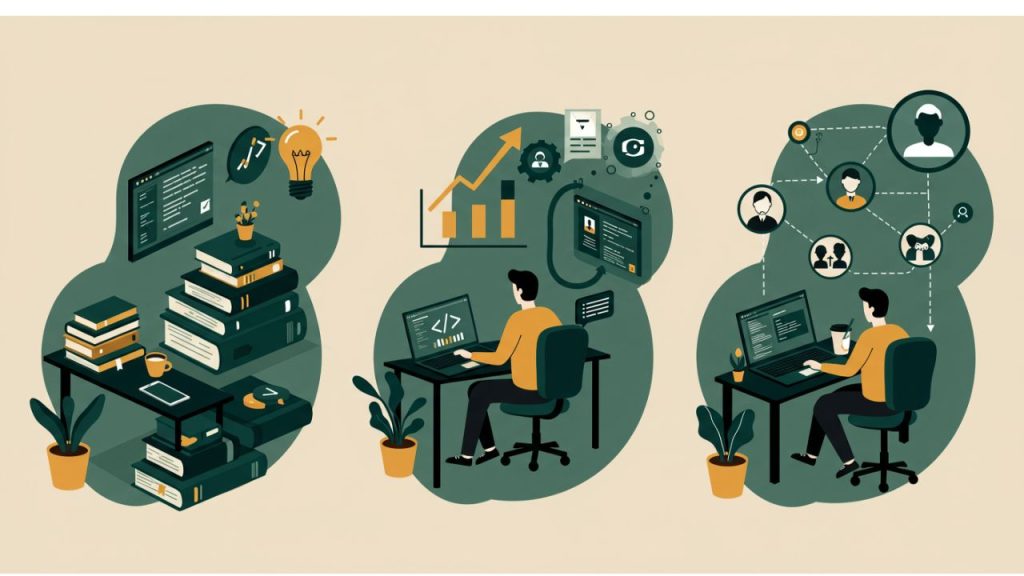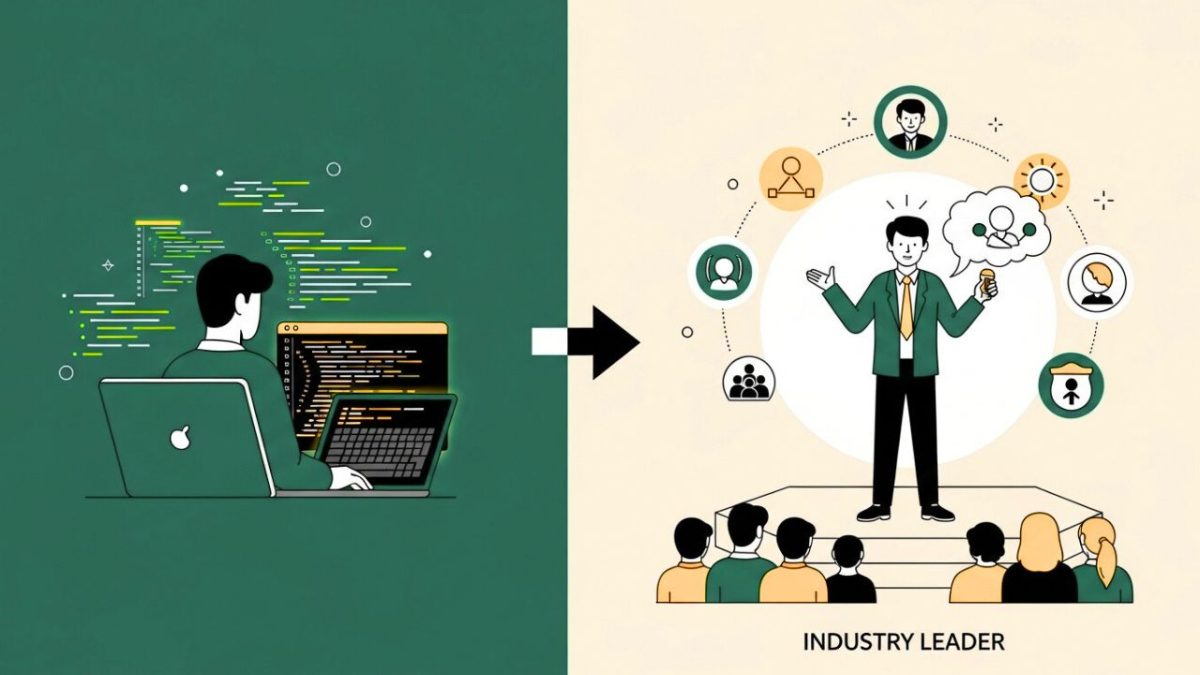Introduction – From Anonymous Coder to Recognized Leader
For decades, software engineers were seen as the “builders” behind the scenes — writing lines of code that powered billion-dollar companies but rarely stepping into the spotlight. Their resumes listed programming languages, projects, and job titles, but their professional identities rarely extended beyond their cubicles or GitHub profiles.
But in today’s digital-first era, the story is changing. More and more engineers are transforming from “just developers” into industry thought leaders — recognized voices shaping conversations about technology, innovation, and the future of work.
This isn’t just about career advancement. It’s about personal branding — the ability to communicate your ideas, values, and expertise in a way that builds trust, influence, and opportunity.
In this blog, we’ll explore how one software engineer’s journey from coder to thought leader illustrates why personal branding matters more than technical skills alone, and what lessons you can apply to your own career.
The Problem: Why Brilliant Engineers Go Unnoticed
The harsh truth is that technical talent alone doesn’t guarantee recognition. Thousands of developers know how to write efficient code or architect complex systems, but only a few are seen as “leaders” in the space.
Why?
- Resumes are invisible online. They summarize what you’ve done but don’t showcase how you think.
- Technical jargon doesn’t inspire trust. Non-technical audiences need relatable storytelling.
- Silence equals irrelevance. In an era where 85% of recruiters check LinkedIn before hiring (LinkedIn Recruiting Trends), having no visible digital footprint can limit opportunities.
That’s why personal branding isn’t optional anymore — it’s essential.
The Shift: From Engineer to Brand
Think of it this way:
- Resume = Past. It tells employers what you’ve done.
- Brand = Present + Future. It shows the world who you are, what you stand for, and where you’re headed.
One software engineer — let’s call him Arjun — learned this firsthand. Arjun was a skilled full-stack developer, but he struggled to stand out in a competitive job market. Recruiters overlooked his resume, even though his technical projects were impressive.
His turning point came when he decided to build a personal brand. Within three years, Arjun went from an unknown developer to an invited keynote speaker at global tech conferences, with thousands of followers who trusted his insights.

Step 1: Finding a Core Narrative
Arjun’s transformation began by asking: “What do I want to be known for?”
Instead of positioning himself as “just a developer,” he crafted a narrative:
“I help engineers write clean, scalable code while preparing for leadership roles in tech.”
This simple positioning gave him clarity — he wasn’t just coding, he was advocating for developer growth and leadership.
Actionable Tip for You: Identify your core narrative. Ask yourself:
- What problem do I consistently solve?
- What values do I stand for?
- What unique perspective can I bring?
Step 2: Showing Up Where It Matters
Resumes live in a drawer. Personal brands live everywhere.
Arjun began posting weekly on LinkedIn, sharing:
- Short case studies about challenges he faced as a developer.
- Thought leadership posts on coding best practices and team dynamics.
- Personal stories about failures and lessons learned.
Result? Within six months, his posts were getting thousands of views. Recruiters and peers began associating him with “practical wisdom for developers.”
Stat Check: Professionals who post weekly on LinkedIn get 10x more profile views and 4x more connection requests (LinkedIn data).
Step 3: Building Credibility Through Content
Arjun didn’t just share surface-level posts — he created value-rich content:
- Guest blogs on Medium about developer career growth.
- A free GitHub repository with leadership resources for engineers.
- A podcast appearance where he discussed transitioning from coder to manager.
This layered content positioned him as a giver, not just a self-promoter.
Case Study Parallel: Simon Sinek’s “Start with Why” brand wasn’t built overnight — it was reinforced by consistent books, talks, and content that all tied back to one core idea.
Step 4: Networking with Purpose
Instead of sending cold resumes, Arjun built authentic connections. He engaged with industry leaders on LinkedIn, commented thoughtfully on their posts, and gradually became part of conversations that mattered.
Soon, those same leaders began inviting him to collaborate, co-author, or speak.
Key Insight: Connections made through a strong brand are warmer, more trusting, and longer-lasting than resume-based applications.
Common Mistakes Engineers Make in Branding
- Hiding behind technical skills. Thinking “my work speaks for itself” doesn’t cut it in the digital age.
- Being inconsistent. Posting once every 6 months doesn’t build credibility.
- Copying others. Authenticity wins. Replicating someone else’s brand feels forced.
- Neglecting storytelling. Facts impress, but stories connect.
The Results: From Resume to Reputation
Arjun’s consistent branding efforts paid off:
- He was invited to speak at two international tech conferences.
- He received multiple job offers without applying.
- He grew a LinkedIn following of 50,000+ engaged professionals.
- He launched a mentoring program for junior engineers, creating additional income streams.
All of this happened because he shifted from “resume-based recognition” to “brand-based influence.”
Future Trends: Why Branding Will Matter Even More
- AI-Powered Recruitment: Hiring tools now scan online presence to measure cultural fit. A resume alone won’t survive this filter.
- Portfolio Platforms: Developers will increasingly be judged by live portfolios, blogs, and GitHub activity.
- Authenticity in the AI Era: With AI generating generic content, a human, authentic voice will be the ultimate differentiator.
- Global Economy: Remote work means your brand can attract opportunities worldwide, far beyond local resumes.
FAQs – Thought Leadership Beyond Coding
Q1: Can personal branding replace my resume?
Not entirely. But it enhances and often outweighs it — your brand makes the resume credible.
Q2: I’m introverted. Can I still build a brand?
Yes. Write blogs, share GitHub projects, or publish tutorials — branding doesn’t always mean public speaking.
Q3: How long does it take to become a thought leader?
Typically 1–3 years of consistent effort. Branding is a marathon, not a sprint.
Q4: Is LinkedIn enough?
It’s a strong foundation, but blogs, podcasts, and open-source contributions expand reach.
Q5: Won’t people think I’m self-promoting?
Not if you provide genuine value. Sharing insights is generosity, not arrogance.
Conclusion – From Engineer to Influence
In a world where resumes are scanned by bots and forgotten in inboxes, personal branding is what makes you unforgettable.
The story of Arjun, the software engineer who became a thought leader, is proof: what you share, how you engage, and the values you embody matter more than bullet points on a CV.
Your resume tells people what you’ve done.
Your personal brand tells people why it matters.
So if you’re a software engineer — or any professional — don’t just polish your resume. Build your brand. That’s how you go from writing code to writing your legacy.




